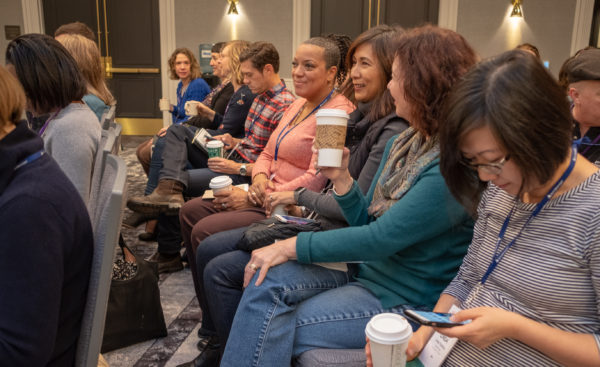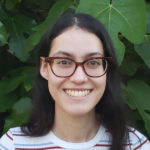

The AMIA Diversity and Inclusion Fellowship Program is the result of collaborative work done by AMIA and the NFPB Diversity Task Force to assess and evaluate the state of diversity, equity, and inclusion in the field of audiovisual archiving. Those efforts have made clear that the profession needs to take major steps to become more equitable and inclusive and more representative of the communities it serves and the histories it shepherds. The Fellowship Pilot is made possible through a contract with the Council on Library and Information Resources (CLIR), with funds provided by the National Film Preservation Board.
The AMIA Diversity and Inclusion Fellowship Program (ADIFP) is designed to expand career opportunities, advance learning objectives and guide professionals from groups that have been traditionally underrepresented in the field of audiovisual archiving and preservation. The program provides online education and professional development opportunities, mentoring, job search coaching, and leadership development, and works with partner organizations who are able to offer paid internship work experience to fellows. The Fellowship Pilot is made possible through a contract with the Council on Library and Information Resources (CLIR), with funds provided by the National Film Preservation Board.
In this pilot year of the initiative, three fellows will participate as “Regional Fellows,” undertaking paid internships with partner host institutions across the US, and three as “Network Fellows”, engaging in remote learning activities independently. All six fellows will engage in weekly webinars over the summer months with audiovisual archives professionals, be matched to mentors from within the AMIA network, and be engaged in projects with AMIA activities leading up to the conference. The program will provide exposure to professional pathways for advancement in the audiovisual archiving job market and fellows with guidance in developing resumes and portfolios.
“In 2016 I listened as members of the AMIA community made a pledge to being a more diverse and inclusive space. This fellowship is an important step in making that pledge real. Each fellow was selected not only for their potential, but for the important work they are already doing – which we all stand to learn from. I have no doubt they will one day be leaders in our field,” said program director Moriah Ulinskas.
“This pilot fellowship is a small yet hugely important step towards the recognition of structural inequalities and barriers that have prevented a wider and more diverse array of individuals participating fully in the audiovisual archiving community. One of the ways of broadening the communities AMIA both involves and serves, is to provide both a structure and culture of support for individuals who have been historically underrepresented in the field. AMIA is so excited to collaborate with this year’s host sites to serve our fellows in creating an engaging and immersive first year of the program. Long term, I think these efforts will help guide AMIA’s work in cultivating new avenues for learning, advocating for paid internships field-wide, increasing equity in labor practices, and meaningfully developing our definition and structure for ongoing mentorship and support,” said AMIA Board member Teague Schneiter.
 Ari Green is a Master’s Candidate in Public History at California State University, Sacramento. She is currently finishing her thesis titled, New Gentrification: An Interdisciplinary Analysis of Sacramento’s Erasure of Blackness Through Public Policy. Ari is a former Digitization Intern for Central Library’s Sacramento Room and has been a member of the National Council on Public History since 2018. She will be interning with California Revealed as an AMIA Fellow. Ari has co-authored a National Historic Landmark and works as a Records Manager for Weintraub Tobin Law Firm. This fall, Ari will further her academic career as a first year doctoral student in Public History at North Carolina State University.
Ari Green is a Master’s Candidate in Public History at California State University, Sacramento. She is currently finishing her thesis titled, New Gentrification: An Interdisciplinary Analysis of Sacramento’s Erasure of Blackness Through Public Policy. Ari is a former Digitization Intern for Central Library’s Sacramento Room and has been a member of the National Council on Public History since 2018. She will be interning with California Revealed as an AMIA Fellow. Ari has co-authored a National Historic Landmark and works as a Records Manager for Weintraub Tobin Law Firm. This fall, Ari will further her academic career as a first year doctoral student in Public History at North Carolina State University.
 Danielle Townsend holds a BA in Broadcasting Telecommunications and Mass Media from Temple University. Since graduating in 2012, she has been devoting her multimedia knowledge and passion for book arts to her family business Colonial Bindery where she gained an interest in preservation and information sciences. Ms. Townsend has just completed her first semester at Clarion University of Pennsylvania where she is pursuing her MSLS. She is thrilled to be participating in the 2020 George Blood Internship and AMIA Diversity and Inclusion Fellowship Program. She aims to uncover media preservation issues concerning people of color and wants to become involved in community and cultural archiving.
Danielle Townsend holds a BA in Broadcasting Telecommunications and Mass Media from Temple University. Since graduating in 2012, she has been devoting her multimedia knowledge and passion for book arts to her family business Colonial Bindery where she gained an interest in preservation and information sciences. Ms. Townsend has just completed her first semester at Clarion University of Pennsylvania where she is pursuing her MSLS. She is thrilled to be participating in the 2020 George Blood Internship and AMIA Diversity and Inclusion Fellowship Program. She aims to uncover media preservation issues concerning people of color and wants to become involved in community and cultural archiving.
 Ferrin Evans is a Master of Information candidate at the University of Toronto. He is currently a media archivist at the university’s Media Commons library and a film programmer with Inside Out Toronto, as well as a volunteer with The ArQuives (Toronto). In the past, he has worked with the Gay Archives of Quebec, Toronto Queer Film Festival, Cinema Politica, and the MIX New York Queer Experimental Film Festival, where he served on the Board of Directors. His research centers on the material-to-digital shift in community archives, as well as the role that information systems and digital media play in diasporic community building.
Ferrin Evans is a Master of Information candidate at the University of Toronto. He is currently a media archivist at the university’s Media Commons library and a film programmer with Inside Out Toronto, as well as a volunteer with The ArQuives (Toronto). In the past, he has worked with the Gay Archives of Quebec, Toronto Queer Film Festival, Cinema Politica, and the MIX New York Queer Experimental Film Festival, where he served on the Board of Directors. His research centers on the material-to-digital shift in community archives, as well as the role that information systems and digital media play in diasporic community building.
 Grace Muñoz is a first-year graduate student completing her MLIS degree at UCLA with a specialization in Media Archival Studies. Prior to her graduate studies, she obtained her BA at UCLA in History with minors in Spanish and Film, Television, and Digital Media. She currently works as a graduate student researcher at the UCLA Chicano Studies Research Center cataloging and creating finding aids for their audiovisual collection. Grace has also volunteered at the USC Hugh M. Hefner Moving Image Archive handling, inspecting, and repairing analog film. Her professional interests include analog film preservation, community-based archives and advocating for marginalized communities through archival work.
Grace Muñoz is a first-year graduate student completing her MLIS degree at UCLA with a specialization in Media Archival Studies. Prior to her graduate studies, she obtained her BA at UCLA in History with minors in Spanish and Film, Television, and Digital Media. She currently works as a graduate student researcher at the UCLA Chicano Studies Research Center cataloging and creating finding aids for their audiovisual collection. Grace has also volunteered at the USC Hugh M. Hefner Moving Image Archive handling, inspecting, and repairing analog film. Her professional interests include analog film preservation, community-based archives and advocating for marginalized communities through archival work.
 Lorena Escala Vignolo graduated with a BA in Audiovisual Communication from the University of Lima. She has been a research assistant and intern at the film magazine Ventana Indiscreta and a programmer at Armando Robles Godoy, the alternative movie theater managed by the Ministry of Culture in Perú. She has worked as part of a technical group reviewing applications of film projects at the Government’s Audiovisual Funding Contests. Lorena is currently studying Film Preservation at Elías Querejeta Zine Eskola in San Sebastián, Spain and working on an investigation on small gauge film in Peru, as well as participating in This Film is Dangerous, a project about the restoration of a nitrate print.
Lorena Escala Vignolo graduated with a BA in Audiovisual Communication from the University of Lima. She has been a research assistant and intern at the film magazine Ventana Indiscreta and a programmer at Armando Robles Godoy, the alternative movie theater managed by the Ministry of Culture in Perú. She has worked as part of a technical group reviewing applications of film projects at the Government’s Audiovisual Funding Contests. Lorena is currently studying Film Preservation at Elías Querejeta Zine Eskola in San Sebastián, Spain and working on an investigation on small gauge film in Peru, as well as participating in This Film is Dangerous, a project about the restoration of a nitrate print.
 Rai Mckinley Terry is interested in engaging the spaces, physical and digital, that Black and specifically Black queer people occupy and adorn as reclamations of life and freedom. With a BA in African and African American Studies-Arts from Brandeis University, Rai has a decade of experience with photography, filmmaking and critical visual studies. Recently, Rai worked in collaboration with a course to create an interactive digital timeline of Black history, and is on the student advisory board of ProjectSTAND. Rai is currently the Fellow of the Public History of Slavery at Brown University where they are pursuing an MA in Public Humanities. They hope to continue to seek and create spaces of Black queer agency and joy and to utilize alternative histories for a truer public education. Rai will be interning with Rhode Island Historical Society as an AMIA Fellow.
Rai Mckinley Terry is interested in engaging the spaces, physical and digital, that Black and specifically Black queer people occupy and adorn as reclamations of life and freedom. With a BA in African and African American Studies-Arts from Brandeis University, Rai has a decade of experience with photography, filmmaking and critical visual studies. Recently, Rai worked in collaboration with a course to create an interactive digital timeline of Black history, and is on the student advisory board of ProjectSTAND. Rai is currently the Fellow of the Public History of Slavery at Brown University where they are pursuing an MA in Public Humanities. They hope to continue to seek and create spaces of Black queer agency and joy and to utilize alternative histories for a truer public education. Rai will be interning with Rhode Island Historical Society as an AMIA Fellow.
Our thanks to our 2020 partner host sites – California Revealed; the Rhode Island Historical Society, and George Blood LP.
California Revealed is a State Library initiative to help California’s public libraries, in partnership with other local heritage groups, digitize, preserve, and provide online access to archival materials – books, newspapers, photographs, audiovisual recordings, and more – that tell the incredible stories of the Golden State. Ari will work with California Revealed’s audiovisual preservation team to inspect, process, and ship media to digitization vendors, perform quality control on digital files, and update description for legacy collections.
The Rhode Island Historical Society, founded in 1822, is the fourth oldest state historical society in the country. Its Moving Image and Recorded Sound collections include an estimated 9 million feet of 16mm film spanning from the 1910s-1980s, 3000 oral histories, and assorted content on various videotape formats. Rai will be involved with day-to-day operations such as prepping and screening local newsfilm “rollettes,” fulfilling patron research requests, cataloging compilation reels, organizing scripts, and creating tape inventories, along with performing more project-based work such as identifying collection materials for online exhibition.
George Blood Audio/Video/Film/Data is a leading provider of audio, moving image, and data preservation and digitization services for libraries, museums, archives, and private collectors. Each month our studio reformats over 15,000 hours of audiovisual media housed on decaying and obsolete carriers to a variety of digital formats. Danielle will gain an understanding of the process of audiovisual preservation reformatting, including inspection, inventory, digitization, and quality control, while acquiring hands-on experience with legacy audiovisual media.
For more information on the Pilot Program, and to stay up to date with developments, email: amia.difpp@gmail.com